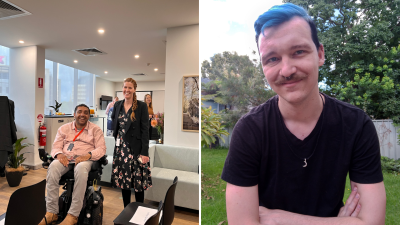Ashleigh is proud and open about her disability at work.

Ashleigh lives with two invisible disabilities; autism and long-term mental illness.
"I feel a deep sense of pride in my identity as a disabled person. I have ups and downs, but I like who I am and how my brain works, and I wouldn’t flick the off switch on my autism even if there were one," Ashleigh said.
"I work best with structure, process, and clarity. My autism makes it difficult for me to operate in ambiguity and uncertainty. I can do it, but it’s uncomfortable. I’ve also had 32 years to perfect masking, which means I can present as neurotypical."
In the workplace, Ashleigh speaks openly about her disability.
"I proudly and openly share I live with a disability at work, both interpersonally and in our systems. ‘Ticking the box’ on disability in an HR system or an anonymous survey helps identify and address issues and measure progress. Data is critical to identifying potential barriers preventing certain groups of people from participating fully at work," Ashleigh said.
"It is unquestionably a personal choice to share this information at work. People with disability, myself included, have experienced prejudice and discrimination based on their disability. Before my autism diagnosis, my request for a workplace adjustment at a previous workplace was met with a dismissal of mental illness as a ‘real disability’ and that I wasn’t ‘disabled enough’ to ask."
Ashleigh shares that experiences like this create stress and anxiety for people with disability when engaging with a potential new employer.
"People with disability are looking at your website to see what you are doing to support them. They are paying attention to how you discuss disability and workplace adjustments. They are checking whether your communications, technology, and premises are accessible," Ashleigh shared.
"I felt supported from my first interview at Life Without Barriers. My request for a workplace adjustment in the form of flexible working arrangements was met with enthusiastic support."
"The flexibility to manage how and where I work ensures I can contribute my best."
"I would be remiss if I didn’t acknowledge that working in Diversity and Inclusion for an organisation that provides disability services affords me a privilege not everyone with disability in the labour force shares.
"Do I think we get it right every time? No. What we can do is be open and honest when things go wrong and commit to doing better next time. We can listen deeply and lead with empathy. We can continue to do the work on access and inclusion to ensure everyone living with a disability feels safe and supported at work."


